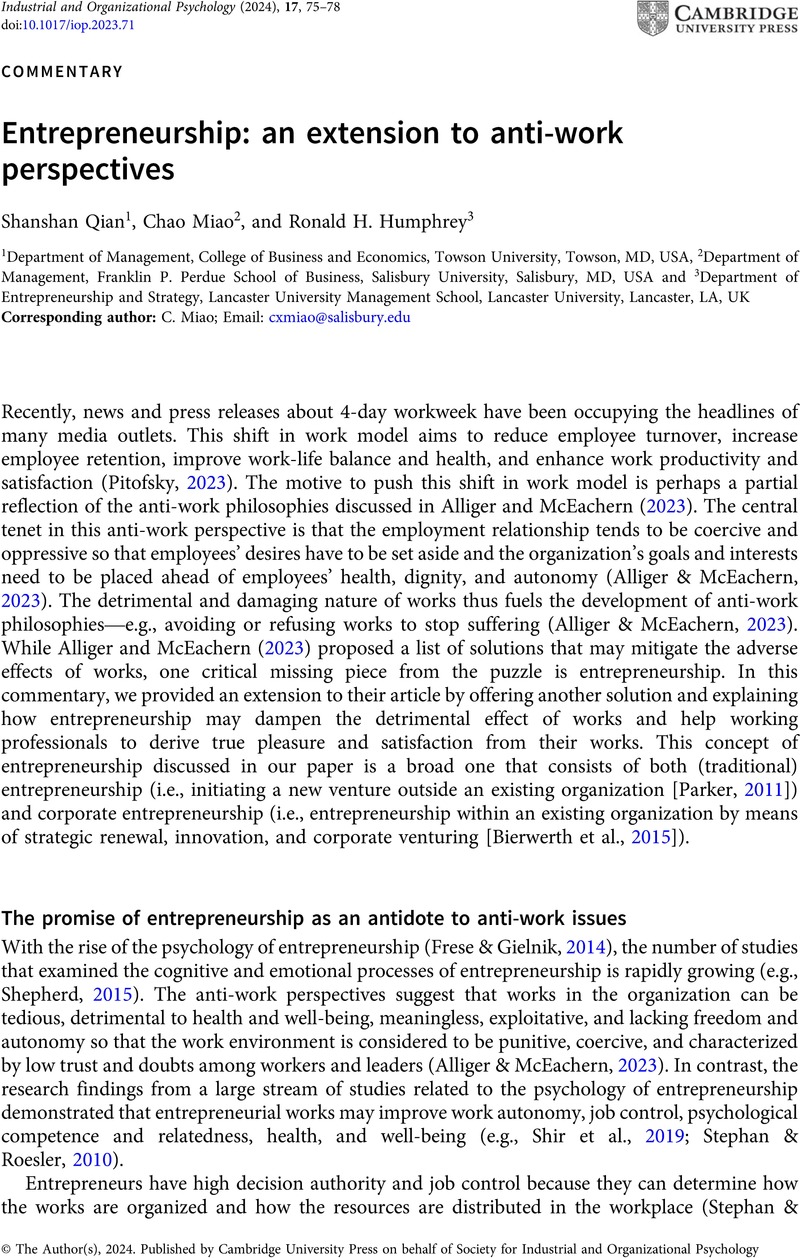No CrossRef data available.
Article contents
Entrepreneurship: an extension to anti-work perspectives
Published online by Cambridge University Press: 07 March 2024
Abstract
An abstract is not available for this content so a preview has been provided. Please use the Get access link above for information on how to access this content.

- Type
- Commentaries
- Information
- Copyright
- © The Author(s), 2024. Published by Cambridge University Press on behalf of Society for Industrial and Organizational Psychology
References
Alliger, G. M., & McEachern, P. J. (2023). Anti-work offers many opportunities for I-O psychologists. Industrial and Organizational Psychology, 1–30.Google Scholar
Åstebro, T., & Chen, J. (2014). The entrepreneurial earnings puzzle: Mismeasurement or real? Journal of Business, 29(1), 88–105.Google Scholar
Bierwerth, M., Schwens, C., Isidor, R., & Kabst, R. (2015). Corporate entrepreneurship and performance: A meta-analysis. Small Business Economics, 45, 255–278.Google Scholar
Clevenger, M. R., & Miao, C. (2022). An ecology of entrepreneurship: A review of concepts, entrepreneurial ecosystems, and entrepreneurial communities from the literature. In Clevenger, M. R., & Fortunato, M. W.-P. (Eds.), Entrepreneurial communities and ecosystems: Theories in culture, empowerment, and leadership. New York, NY: Routledge.Google Scholar
Deci, E. L., & Ryan, R. M. (2000). The “what” and “why” of goal pursuits: Human needs and the self-determination of behavior. Psychological Inquiry, 11
(4), 227–268.Google Scholar
Ezzedeen, S. R., & Zikic, J. (2017). Finding balance amid boundarylessness: An interpretive study of entrepreneurial work-life balance and boundary management. Journal of Family Issues, 38(11), 1546–1576.Google Scholar
Feng, J., Allen, D. G., & Seibert, S. E. (2022). Once an entrepreneur, always an entrepreneur? Entrepreneurial identity, job characteristics, and voluntary turnover of former entrepreneurs in paid employment. Personnel Psychology, 75(1), 179–213.Google Scholar
Frese, M., & Gielnik, M. M. (2014). The psychology of entrepreneurship. Annual Review of Organizational Psychology and Organizational Behavior, 1(1), 413–438.Google Scholar
Fried, Y., & Ferris, G. R. (1987). The validity of the job characteristics model: A review and meta-analysis. Personnel Psychology, 40(2), 287–322.Google Scholar
Haynie, J. M., & Shepherd, D. (2011). Toward a theory of discontinuous career transition: Investigating career transitions necessitated by traumatic life events. Journal of Applied Psychology, 96(3), 501–524.Google Scholar
Haynie, J. M., Shepherd, D. A., & Patzelt, H. (2012). Cognitive adaptability and an entrepreneurial task: The role of metacognitive ability and feedback. Entrepreneurship Theory and Practice, 36(2), 237–265.Google Scholar
Parker, S. C. (2011). Intrapreneurship or entrepreneurship? Journal of Business Venturing, 26(1), 19–34.Google Scholar
Pitofsky, M. (2023). Employers tried a 4-day workweek program. Employees said they were healthier and happier. Retrieved from https://www.usatoday.com/story/money/2023/02/21/four-day-workweek-employees-happier-healthier/11313646002/.Google Scholar
Shepherd, D. (2015). Party On! A call for entrepreneurship research that is more interactive, activity based, cognitively hot, compassionate, and prosocial. Journal of Business Venturing, 30(4), 489–507.Google Scholar
Shir, N., Nikolaev, B. N., & Wincent, J. (2019). Entrepreneurship and well-being: The role of psychological autonomy, competence, and relatedness. Journal of Business Venturing, 34(5), 105875.Google Scholar
Stephan, U. (2018). Entrepreneurs’ mental health and well-being: A review and research agenda. Academy of Management Perspectives, 32, 290–322.Google Scholar
Stephan, U., Rauch, A., & Hatak, I. (2023). Happy entrepreneurs? Everywhere? A meta-analysis of entrepreneurship and wellbeing. Entrepreneurship Theory and Practice, 47(2), 553–593.Google Scholar
Stephan, U., & Roesler, U. (2010). Health of entrepreneurs versus employees in a national representative sample. Journal of Occupational and Organizational Psychology, 83
(3), 717–738.Google Scholar




